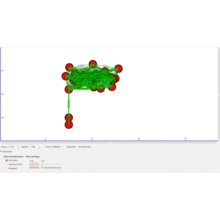Delay Tolerant Network (DTN) is specially meant for addressing the technical issues that interrupt the heterogeneous network. In DTN, the bundle layer creates overlays to deliver internetworking communications on HetNets. Here, the disturbance of the network may occur due to the restricted wireless radio range, inaccessibility of mobile nodes, low energy resources, undesired attack, and noise. As a point of fact, DTN offers many challenging Delay Tolerant Networks Thesis Ideas for scholars. Particularly, this field meets numerous optimizations on standard Adhoc and DTN algorithms to inspect features such as safety, consistency, verifiability, and other areas. Also, routing plays a crucial role in transmitting data from source to endpoint in DTN.
This article presents the important research perceptions of the Delay Tolerant Networks!!!
Important Routing Protocols in DTN
In many cases of DTN, there is not any optimum route for communication. The reasons behind this issue are node movement, sparse node compactness, wireless propagation effects, and other opposing factors. For this type of network, standard ad hoc routing protocols fail to work.
- PROPHET
- Epidemic
- Spray and Wait
For instance, Contact Graph Routing (CGR) is a technique that picks out routes in a dynamic way. For this, it uses a time-varying topology of arranged network communication. And, these networks experience any combination of the issues.

Research Challenges in Delay Tolerant Network
- Discontinuous Connectivity
- Failure of end-to-end Link
- Uneven Data Rate
- Large and Variable Delay
- High Packet Errors
- Sparse Network Link
How Does DTN Work?
As mentioned earlier, DTN is popularly known in the networking model which forms the system of rules for data sharing. In other words, it is often denoted as a protocol suite that outspreads the global internet capabilities into challenging environments. These infrastructures quite often face many disruptions on communication links which possibly results in long delays and high error rates. For instance, the channel is limited to one direction.
So far, we have discussed the main requirements of DTN with its challenges. Further, if you want to sharpen your intelligence in DTN, you can go through the research study materials. By referring to textbooks of DTN, we will get full-fledged information on the following areas.
What do we get from DTN textbooks?
- System Architecture of DTN
- Fundamentals Concepts of DTN
- DTN Bundle Layer Protocols
- Routing protocols of DTN
- DTN Simulation with Results
- Data Dissemination in DTN
- Applications of DTN
- DTN Integral Fields with enabling Technologies
For your ease, our experts have given some list of books which is easy to understand the concepts. Hence, to acquire in-depth subject knowledge, you can refer following textbooks. In the time of research and development of your Delay Tolerant Networks Thesis Ideas, you will find these books are quite useful.
Research Books in DTN
- Reliability and Fault‐Tolerant and Delay‐Tolerant Routing
- Author(s) – Sudip Misra ; Sumit Goswami
- Pages – 377 – 410, Publisher: Wiley Telecom, Copyright Year: 2014, Edition: 1
- Description
- Obtainability of Reliable Network
- Routing Protocols for DTN
- Utilization of Policy‐based Network Management
- Automate Decision‐Making
- Quality of Service in Wireless Networks Over Unlicensed Spectrum
- Author(s) – Klara Nahrstedt
- Pages – 176, Publisher: Morgan & Claypool, Copyright Year: 2011
- Description
- Deployment of wireless multimedia applications
- Use of WiFi (IEEE 802.11) and Bluetooth wireless networks
- Impact of Unlicensed spectrum wireless interfaces
- Routing Protocols in Intermittently Connected Mobile Ad Hoc Networks and Delay‐Tolerant Networks
- Author(s) – Azzedine Boukerche
- Pages – 219 – 250, Publisher: Wiley-IEEE Press, Copyright Year: 2009
- Description
- Algorithms for MANET
- Routing Protocols
- Control of Network‐Wide Transmission in Multihop
- Deterministic Routing Stochastic or Dynamic Networks
- Towards Delay‐Tolerant Cognitive Cellular Networks
- Author(s) – Konstantinos Samdanis ; Peter Rost ; Andreas Maeder ; Michela Meo ; Christos Verikoukis
- Pages – 199 – 216, Publisher: Wiley Telecom, Copyright Year: 2014, Edition: 1
- Description
- Future Technologies of Cellular Networks
- Collaboration of DTN with Cognitive Network
- Accomplishment of Energy Saving
- Opportunistic Video Delivery Services in Delay Tolerant Networks
- Author(s) – Sanjoy Paul
- Pages – 141 – 168, Publisher: Wiley Telecom, Copyright Year: 2011, Edition: 1
- Description
- Video Compression, Encode and Transportation without Data Loss
- Internet Protocol Television (IPTV) versus Internet Television
- Multicast Opportunistic Communication
- Applications in Delay-Tolerant and Opportunistic Networks
- Author(s) – Stefano Basagni ; Marco Conti ; Silvia Giordano ; Ivan Stojmenovic
- Pages – 315 – 359, Publisher: Wiley-IEEE Press, Copyright Year: 2013, Edition: 2
- Description
- Technologies in Mobile Multihop Wireless Networking
- Real-time Application and Deployment Scenarios
- Security in Wireless Ad Hoc Communication
- Delay/Disruption‐Tolerant Mobile RFID Networks: Challenges and Opportunities
- Author(s) – Miodrag Bolic ; David Simplot-Ryl ; Ivan Stojmenovic
- Pages – 349 – 362, Publisher: Wiley Telecom, Copyright Year: 2010, Edition: 1
- Description
- Passive UHF RFID Systems Performance Evaluation
- Operational and Performance Metrics of RFID Systems
- Antennas and Tag Chip Design
- Large Scale Networks and Mean Field Theory
- Author(s) – Savo G. Glisic
- Pages – 659 – 725, Publisher: Wiley Telecom, Copyright Year: 2016, Edition: 3
- Description
- Utilization of MFT in DTN System Analysis
- Formation of Integrated Framework via Differential Equations (DEs)
- M2M Communications
- Author(s) – Rath Vannithamby ; Shilpa Talwar
- Pages – 250 – 274, Publisher: Wiley Telecom, Copyright Year: 2017, Edition: 1
- Description
- Challenges and Emerging Technologies in M2M
- LTE Path for Low Data‐rate and Delay‐tolerant M2M Services
- Characteristics to Increase Coverage Area and Battery Lifetime
- Delay Tolerant Networks: Protocols and Applications (Wireless Networks and Mobile Communications)
- Author(s) – Athanasios V. Vasilakos, Yan Zhang, Thrasyvoulos Spyropoulos
- Pages – 362, Publisher: CRC Press, Copyright Year: 2011, Edition: 1
- Description
- Message Flooding and Relay Methodologies
- Communication Delay and Network Resource or Power Consumption
On the whole, we are ready to provide you flawless service was starting from selecting Delay Tolerant Networks Thesis Ideas till the thesis writing.

 Click Here to watch our latest output video using NS3 simulator
Click Here to watch our latest output video using NS3 simulator  Click Here to watch our latest projects screenshots using NS3 simulator
Click Here to watch our latest projects screenshots using NS3 simulator